Leadership and Management for Service Industries: The Imperial Hotel
VerifiedAdded on 2023/06/17
|12
|4111
|249
Report
AI Summary
This report analyzes leadership and management within service industries, focusing on classical management theories, leadership styles, and sustainable management practices. It examines the roles of leaders and various leadership styles, including autocratic, transactional, and democratic approaches, within The Imperial Hotel. The report also compares and contrasts sustainable management and leadership styles, considering internal and external factors influencing sustainable leadership. Furthermore, it discusses current and future management skills, the impact of change management, and the challenges facing sustainable leadership. The analysis incorporates a change management model to illustrate how organizations implement change, affecting both management skills and leadership styles. The report concludes by summarizing the key findings and implications for leadership and management in service industries.
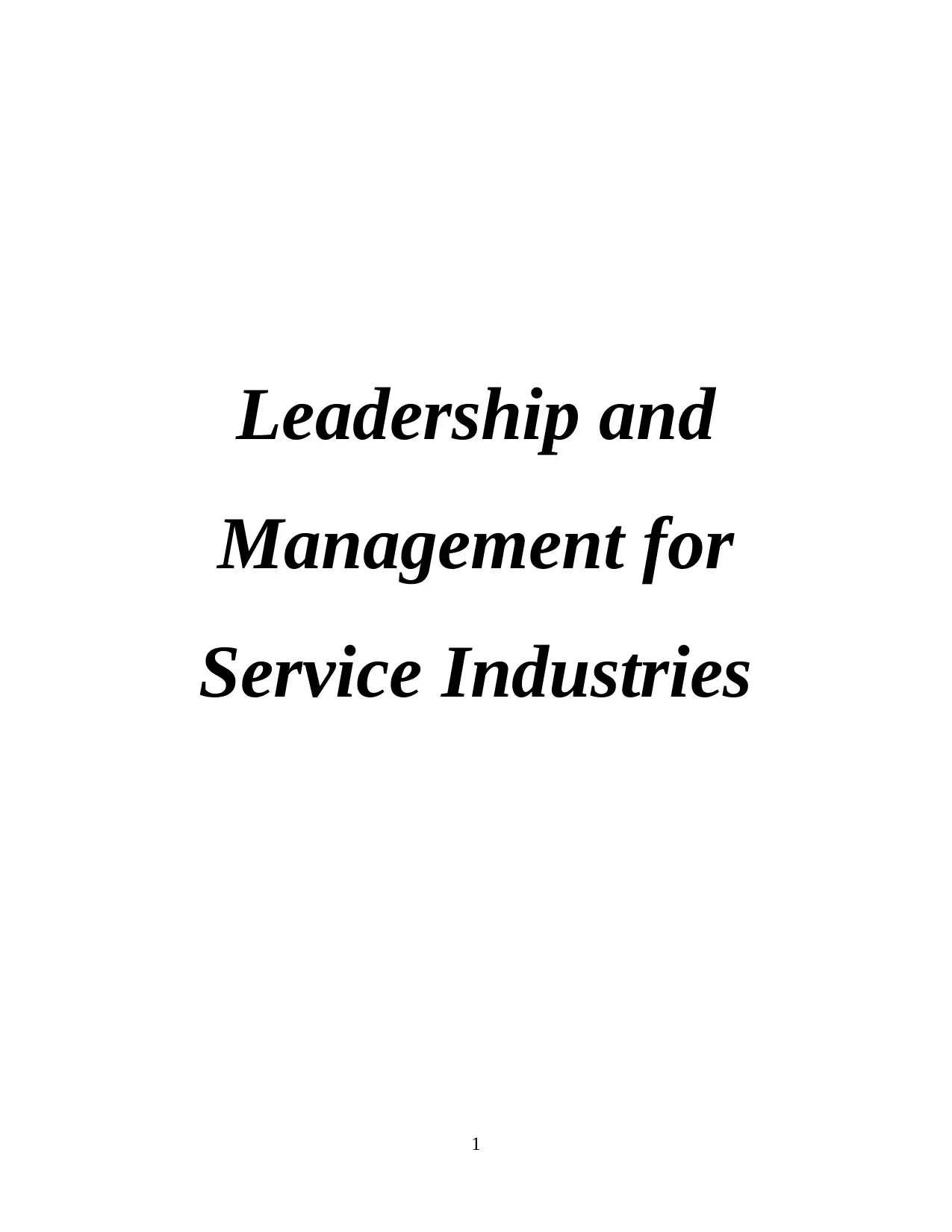
Leadership and
Management for
Service Industries
1
Management for
Service Industries
1
Paraphrase This Document
Need a fresh take? Get an instant paraphrase of this document with our AI Paraphraser
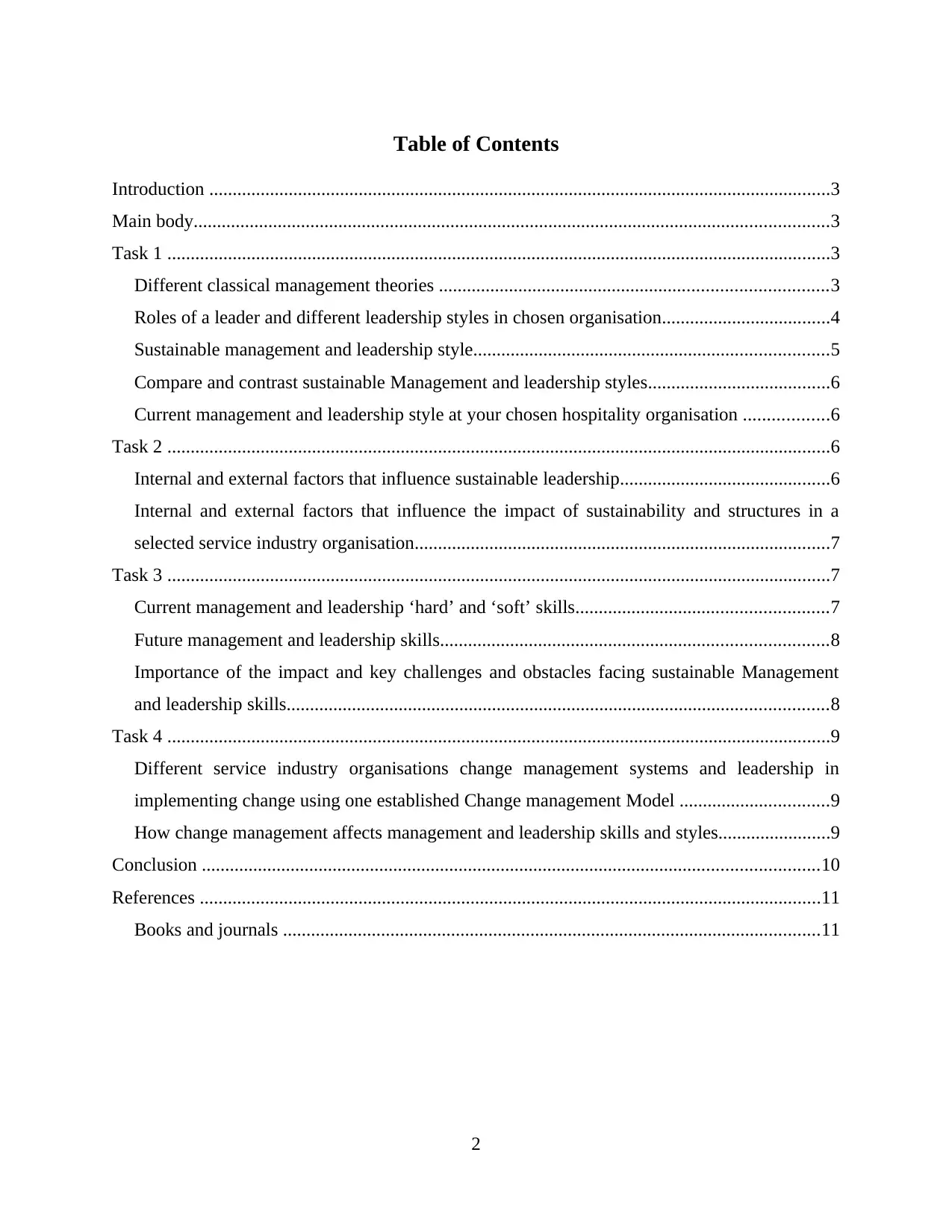
Table of Contents
Introduction .....................................................................................................................................3
Main body........................................................................................................................................3
Task 1 ..............................................................................................................................................3
Different classical management theories ...................................................................................3
Roles of a leader and different leadership styles in chosen organisation....................................4
Sustainable management and leadership style............................................................................5
Compare and contrast sustainable Management and leadership styles.......................................6
Current management and leadership style at your chosen hospitality organisation ..................6
Task 2 ..............................................................................................................................................6
Internal and external factors that influence sustainable leadership.............................................6
Internal and external factors that influence the impact of sustainability and structures in a
selected service industry organisation.........................................................................................7
Task 3 ..............................................................................................................................................7
Current management and leadership ‘hard’ and ‘soft’ skills......................................................7
Future management and leadership skills...................................................................................8
Importance of the impact and key challenges and obstacles facing sustainable Management
and leadership skills....................................................................................................................8
Task 4 ..............................................................................................................................................9
Different service industry organisations change management systems and leadership in
implementing change using one established Change management Model ................................9
How change management affects management and leadership skills and styles........................9
Conclusion ....................................................................................................................................10
References .....................................................................................................................................11
Books and journals ...................................................................................................................11
2
Introduction .....................................................................................................................................3
Main body........................................................................................................................................3
Task 1 ..............................................................................................................................................3
Different classical management theories ...................................................................................3
Roles of a leader and different leadership styles in chosen organisation....................................4
Sustainable management and leadership style............................................................................5
Compare and contrast sustainable Management and leadership styles.......................................6
Current management and leadership style at your chosen hospitality organisation ..................6
Task 2 ..............................................................................................................................................6
Internal and external factors that influence sustainable leadership.............................................6
Internal and external factors that influence the impact of sustainability and structures in a
selected service industry organisation.........................................................................................7
Task 3 ..............................................................................................................................................7
Current management and leadership ‘hard’ and ‘soft’ skills......................................................7
Future management and leadership skills...................................................................................8
Importance of the impact and key challenges and obstacles facing sustainable Management
and leadership skills....................................................................................................................8
Task 4 ..............................................................................................................................................9
Different service industry organisations change management systems and leadership in
implementing change using one established Change management Model ................................9
How change management affects management and leadership skills and styles........................9
Conclusion ....................................................................................................................................10
References .....................................................................................................................................11
Books and journals ...................................................................................................................11
2
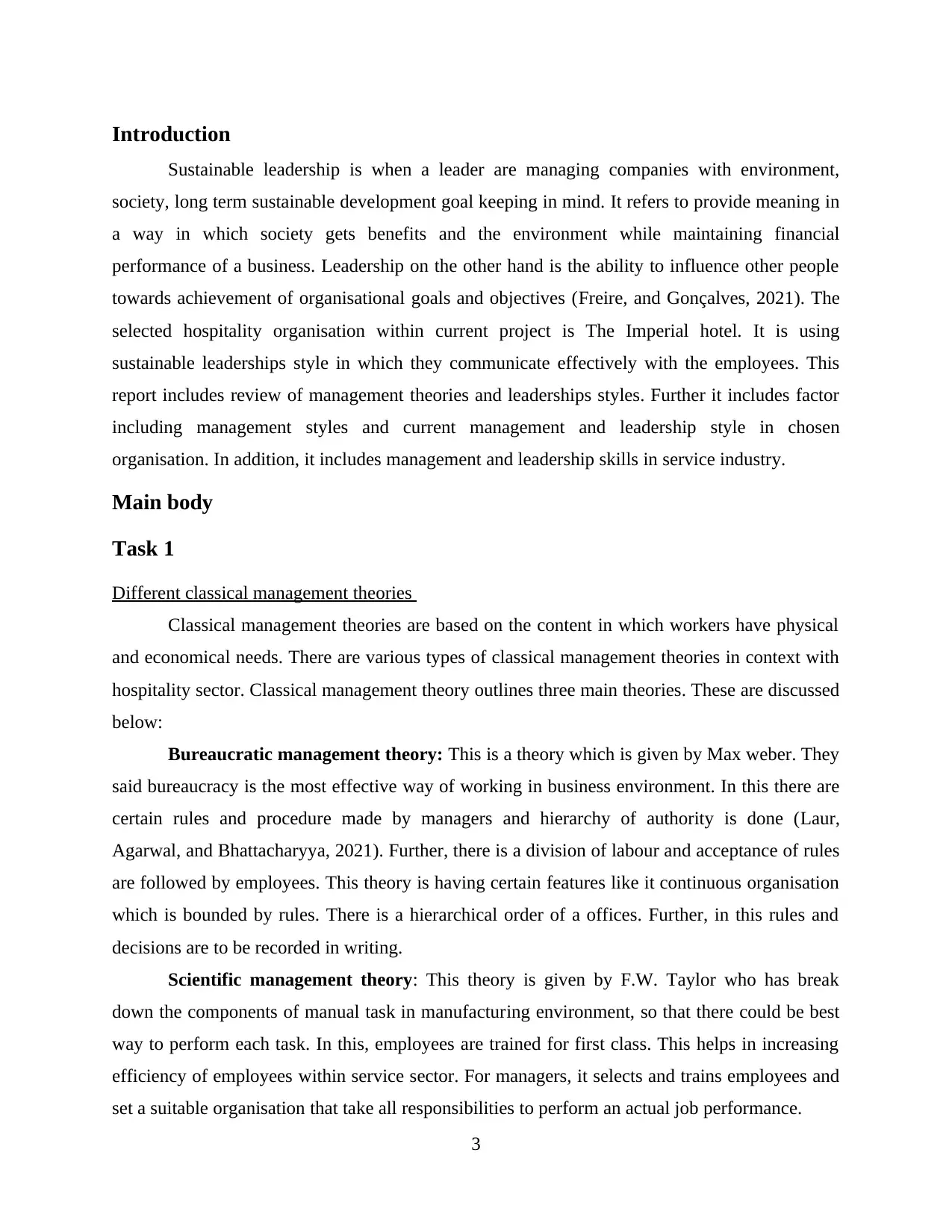
Introduction
Sustainable leadership is when a leader are managing companies with environment,
society, long term sustainable development goal keeping in mind. It refers to provide meaning in
a way in which society gets benefits and the environment while maintaining financial
performance of a business. Leadership on the other hand is the ability to influence other people
towards achievement of organisational goals and objectives (Freire, and Gonçalves, 2021). The
selected hospitality organisation within current project is The Imperial hotel. It is using
sustainable leaderships style in which they communicate effectively with the employees. This
report includes review of management theories and leaderships styles. Further it includes factor
including management styles and current management and leadership style in chosen
organisation. In addition, it includes management and leadership skills in service industry.
Main body
Task 1
Different classical management theories
Classical management theories are based on the content in which workers have physical
and economical needs. There are various types of classical management theories in context with
hospitality sector. Classical management theory outlines three main theories. These are discussed
below:
Bureaucratic management theory: This is a theory which is given by Max weber. They
said bureaucracy is the most effective way of working in business environment. In this there are
certain rules and procedure made by managers and hierarchy of authority is done (Laur,
Agarwal, and Bhattacharyya, 2021). Further, there is a division of labour and acceptance of rules
are followed by employees. This theory is having certain features like it continuous organisation
which is bounded by rules. There is a hierarchical order of a offices. Further, in this rules and
decisions are to be recorded in writing.
Scientific management theory: This theory is given by F.W. Taylor who has break
down the components of manual task in manufacturing environment, so that there could be best
way to perform each task. In this, employees are trained for first class. This helps in increasing
efficiency of employees within service sector. For managers, it selects and trains employees and
set a suitable organisation that take all responsibilities to perform an actual job performance.
3
Sustainable leadership is when a leader are managing companies with environment,
society, long term sustainable development goal keeping in mind. It refers to provide meaning in
a way in which society gets benefits and the environment while maintaining financial
performance of a business. Leadership on the other hand is the ability to influence other people
towards achievement of organisational goals and objectives (Freire, and Gonçalves, 2021). The
selected hospitality organisation within current project is The Imperial hotel. It is using
sustainable leaderships style in which they communicate effectively with the employees. This
report includes review of management theories and leaderships styles. Further it includes factor
including management styles and current management and leadership style in chosen
organisation. In addition, it includes management and leadership skills in service industry.
Main body
Task 1
Different classical management theories
Classical management theories are based on the content in which workers have physical
and economical needs. There are various types of classical management theories in context with
hospitality sector. Classical management theory outlines three main theories. These are discussed
below:
Bureaucratic management theory: This is a theory which is given by Max weber. They
said bureaucracy is the most effective way of working in business environment. In this there are
certain rules and procedure made by managers and hierarchy of authority is done (Laur,
Agarwal, and Bhattacharyya, 2021). Further, there is a division of labour and acceptance of rules
are followed by employees. This theory is having certain features like it continuous organisation
which is bounded by rules. There is a hierarchical order of a offices. Further, in this rules and
decisions are to be recorded in writing.
Scientific management theory: This theory is given by F.W. Taylor who has break
down the components of manual task in manufacturing environment, so that there could be best
way to perform each task. In this, employees are trained for first class. This helps in increasing
efficiency of employees within service sector. For managers, it selects and trains employees and
set a suitable organisation that take all responsibilities to perform an actual job performance.
3
⊘ This is a preview!⊘
Do you want full access?
Subscribe today to unlock all pages.

Trusted by 1+ million students worldwide
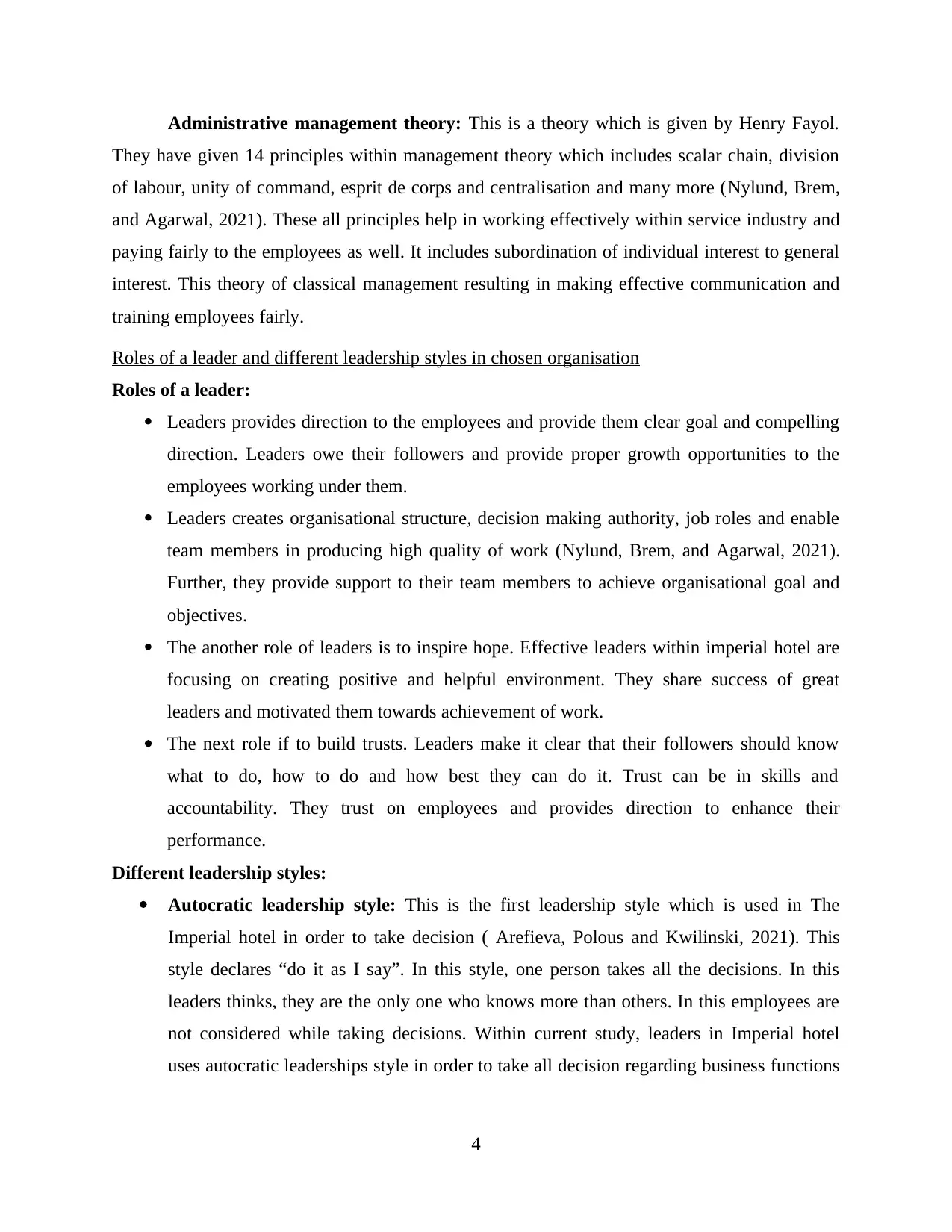
Administrative management theory: This is a theory which is given by Henry Fayol.
They have given 14 principles within management theory which includes scalar chain, division
of labour, unity of command, esprit de corps and centralisation and many more (Nylund, Brem,
and Agarwal, 2021). These all principles help in working effectively within service industry and
paying fairly to the employees as well. It includes subordination of individual interest to general
interest. This theory of classical management resulting in making effective communication and
training employees fairly.
Roles of a leader and different leadership styles in chosen organisation
Roles of a leader:
Leaders provides direction to the employees and provide them clear goal and compelling
direction. Leaders owe their followers and provide proper growth opportunities to the
employees working under them.
Leaders creates organisational structure, decision making authority, job roles and enable
team members in producing high quality of work (Nylund, Brem, and Agarwal, 2021).
Further, they provide support to their team members to achieve organisational goal and
objectives.
The another role of leaders is to inspire hope. Effective leaders within imperial hotel are
focusing on creating positive and helpful environment. They share success of great
leaders and motivated them towards achievement of work.
The next role if to build trusts. Leaders make it clear that their followers should know
what to do, how to do and how best they can do it. Trust can be in skills and
accountability. They trust on employees and provides direction to enhance their
performance.
Different leadership styles:
Autocratic leadership style: This is the first leadership style which is used in The
Imperial hotel in order to take decision ( Arefieva, Polous and Kwilinski, 2021). This
style declares “do it as I say”. In this style, one person takes all the decisions. In this
leaders thinks, they are the only one who knows more than others. In this employees are
not considered while taking decisions. Within current study, leaders in Imperial hotel
uses autocratic leaderships style in order to take all decision regarding business functions
4
They have given 14 principles within management theory which includes scalar chain, division
of labour, unity of command, esprit de corps and centralisation and many more (Nylund, Brem,
and Agarwal, 2021). These all principles help in working effectively within service industry and
paying fairly to the employees as well. It includes subordination of individual interest to general
interest. This theory of classical management resulting in making effective communication and
training employees fairly.
Roles of a leader and different leadership styles in chosen organisation
Roles of a leader:
Leaders provides direction to the employees and provide them clear goal and compelling
direction. Leaders owe their followers and provide proper growth opportunities to the
employees working under them.
Leaders creates organisational structure, decision making authority, job roles and enable
team members in producing high quality of work (Nylund, Brem, and Agarwal, 2021).
Further, they provide support to their team members to achieve organisational goal and
objectives.
The another role of leaders is to inspire hope. Effective leaders within imperial hotel are
focusing on creating positive and helpful environment. They share success of great
leaders and motivated them towards achievement of work.
The next role if to build trusts. Leaders make it clear that their followers should know
what to do, how to do and how best they can do it. Trust can be in skills and
accountability. They trust on employees and provides direction to enhance their
performance.
Different leadership styles:
Autocratic leadership style: This is the first leadership style which is used in The
Imperial hotel in order to take decision ( Arefieva, Polous and Kwilinski, 2021). This
style declares “do it as I say”. In this style, one person takes all the decisions. In this
leaders thinks, they are the only one who knows more than others. In this employees are
not considered while taking decisions. Within current study, leaders in Imperial hotel
uses autocratic leaderships style in order to take all decision regarding business functions
4
Paraphrase This Document
Need a fresh take? Get an instant paraphrase of this document with our AI Paraphraser
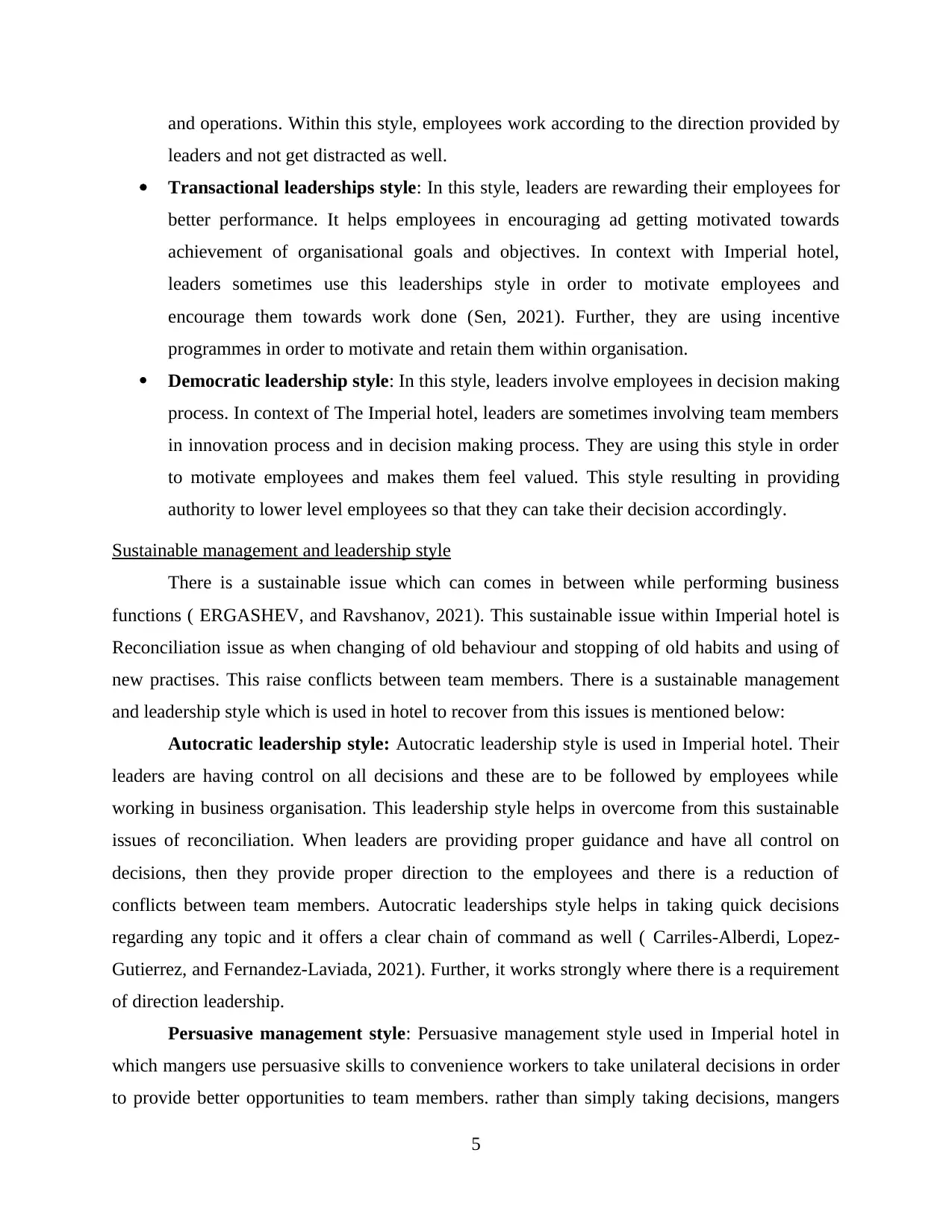
and operations. Within this style, employees work according to the direction provided by
leaders and not get distracted as well.
Transactional leaderships style: In this style, leaders are rewarding their employees for
better performance. It helps employees in encouraging ad getting motivated towards
achievement of organisational goals and objectives. In context with Imperial hotel,
leaders sometimes use this leaderships style in order to motivate employees and
encourage them towards work done (Sen, 2021). Further, they are using incentive
programmes in order to motivate and retain them within organisation.
Democratic leadership style: In this style, leaders involve employees in decision making
process. In context of The Imperial hotel, leaders are sometimes involving team members
in innovation process and in decision making process. They are using this style in order
to motivate employees and makes them feel valued. This style resulting in providing
authority to lower level employees so that they can take their decision accordingly.
Sustainable management and leadership style
There is a sustainable issue which can comes in between while performing business
functions ( ERGASHEV, and Ravshanov, 2021). This sustainable issue within Imperial hotel is
Reconciliation issue as when changing of old behaviour and stopping of old habits and using of
new practises. This raise conflicts between team members. There is a sustainable management
and leadership style which is used in hotel to recover from this issues is mentioned below:
Autocratic leadership style: Autocratic leadership style is used in Imperial hotel. Their
leaders are having control on all decisions and these are to be followed by employees while
working in business organisation. This leadership style helps in overcome from this sustainable
issues of reconciliation. When leaders are providing proper guidance and have all control on
decisions, then they provide proper direction to the employees and there is a reduction of
conflicts between team members. Autocratic leaderships style helps in taking quick decisions
regarding any topic and it offers a clear chain of command as well ( Carriles-Alberdi, Lopez-
Gutierrez, and Fernandez-Laviada, 2021). Further, it works strongly where there is a requirement
of direction leadership.
Persuasive management style: Persuasive management style used in Imperial hotel in
which mangers use persuasive skills to convenience workers to take unilateral decisions in order
to provide better opportunities to team members. rather than simply taking decisions, mangers
5
leaders and not get distracted as well.
Transactional leaderships style: In this style, leaders are rewarding their employees for
better performance. It helps employees in encouraging ad getting motivated towards
achievement of organisational goals and objectives. In context with Imperial hotel,
leaders sometimes use this leaderships style in order to motivate employees and
encourage them towards work done (Sen, 2021). Further, they are using incentive
programmes in order to motivate and retain them within organisation.
Democratic leadership style: In this style, leaders involve employees in decision making
process. In context of The Imperial hotel, leaders are sometimes involving team members
in innovation process and in decision making process. They are using this style in order
to motivate employees and makes them feel valued. This style resulting in providing
authority to lower level employees so that they can take their decision accordingly.
Sustainable management and leadership style
There is a sustainable issue which can comes in between while performing business
functions ( ERGASHEV, and Ravshanov, 2021). This sustainable issue within Imperial hotel is
Reconciliation issue as when changing of old behaviour and stopping of old habits and using of
new practises. This raise conflicts between team members. There is a sustainable management
and leadership style which is used in hotel to recover from this issues is mentioned below:
Autocratic leadership style: Autocratic leadership style is used in Imperial hotel. Their
leaders are having control on all decisions and these are to be followed by employees while
working in business organisation. This leadership style helps in overcome from this sustainable
issues of reconciliation. When leaders are providing proper guidance and have all control on
decisions, then they provide proper direction to the employees and there is a reduction of
conflicts between team members. Autocratic leaderships style helps in taking quick decisions
regarding any topic and it offers a clear chain of command as well ( Carriles-Alberdi, Lopez-
Gutierrez, and Fernandez-Laviada, 2021). Further, it works strongly where there is a requirement
of direction leadership.
Persuasive management style: Persuasive management style used in Imperial hotel in
which mangers use persuasive skills to convenience workers to take unilateral decisions in order
to provide better opportunities to team members. rather than simply taking decisions, mangers
5
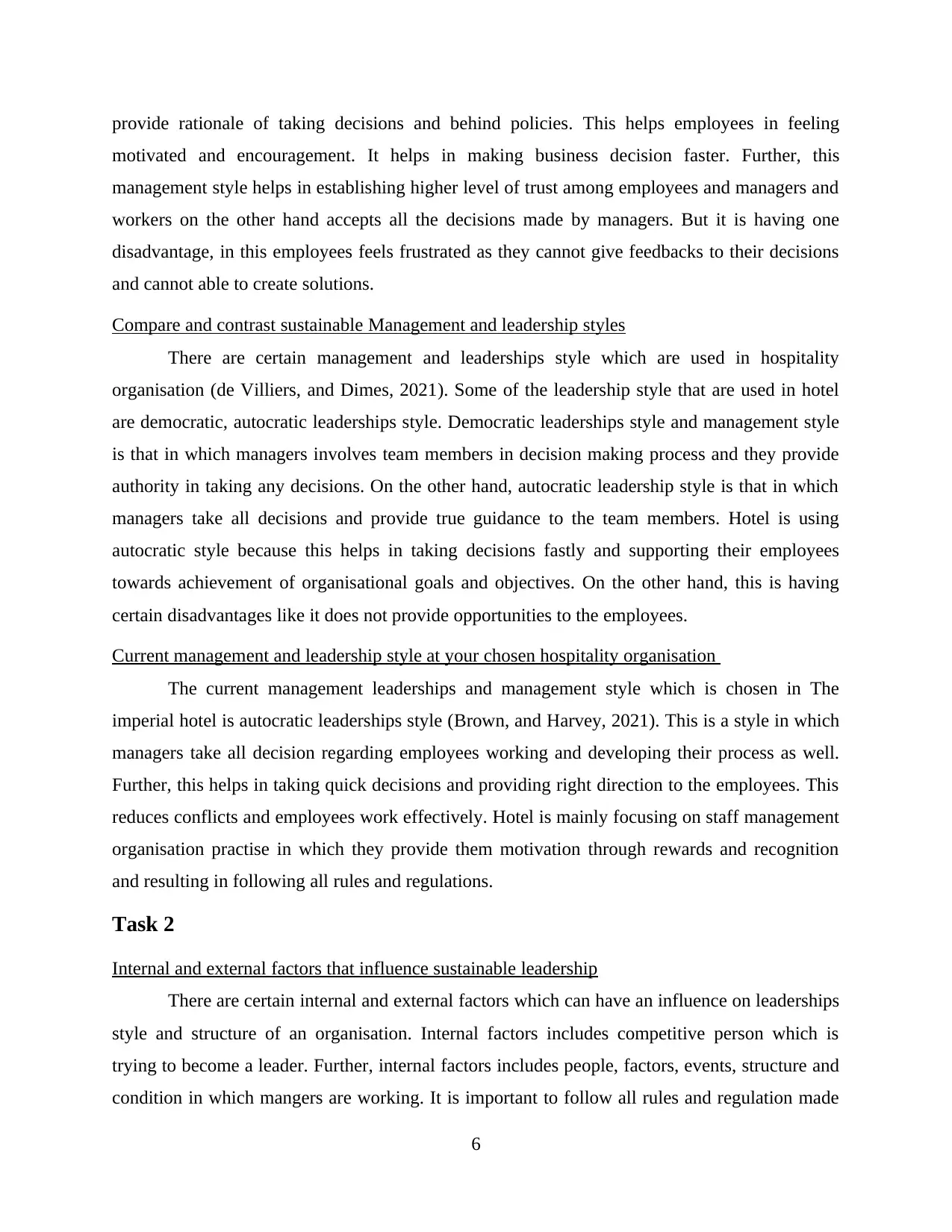
provide rationale of taking decisions and behind policies. This helps employees in feeling
motivated and encouragement. It helps in making business decision faster. Further, this
management style helps in establishing higher level of trust among employees and managers and
workers on the other hand accepts all the decisions made by managers. But it is having one
disadvantage, in this employees feels frustrated as they cannot give feedbacks to their decisions
and cannot able to create solutions.
Compare and contrast sustainable Management and leadership styles
There are certain management and leaderships style which are used in hospitality
organisation (de Villiers, and Dimes, 2021). Some of the leadership style that are used in hotel
are democratic, autocratic leaderships style. Democratic leaderships style and management style
is that in which managers involves team members in decision making process and they provide
authority in taking any decisions. On the other hand, autocratic leadership style is that in which
managers take all decisions and provide true guidance to the team members. Hotel is using
autocratic style because this helps in taking decisions fastly and supporting their employees
towards achievement of organisational goals and objectives. On the other hand, this is having
certain disadvantages like it does not provide opportunities to the employees.
Current management and leadership style at your chosen hospitality organisation
The current management leaderships and management style which is chosen in The
imperial hotel is autocratic leaderships style (Brown, and Harvey, 2021). This is a style in which
managers take all decision regarding employees working and developing their process as well.
Further, this helps in taking quick decisions and providing right direction to the employees. This
reduces conflicts and employees work effectively. Hotel is mainly focusing on staff management
organisation practise in which they provide them motivation through rewards and recognition
and resulting in following all rules and regulations.
Task 2
Internal and external factors that influence sustainable leadership
There are certain internal and external factors which can have an influence on leaderships
style and structure of an organisation. Internal factors includes competitive person which is
trying to become a leader. Further, internal factors includes people, factors, events, structure and
condition in which mangers are working. It is important to follow all rules and regulation made
6
motivated and encouragement. It helps in making business decision faster. Further, this
management style helps in establishing higher level of trust among employees and managers and
workers on the other hand accepts all the decisions made by managers. But it is having one
disadvantage, in this employees feels frustrated as they cannot give feedbacks to their decisions
and cannot able to create solutions.
Compare and contrast sustainable Management and leadership styles
There are certain management and leaderships style which are used in hospitality
organisation (de Villiers, and Dimes, 2021). Some of the leadership style that are used in hotel
are democratic, autocratic leaderships style. Democratic leaderships style and management style
is that in which managers involves team members in decision making process and they provide
authority in taking any decisions. On the other hand, autocratic leadership style is that in which
managers take all decisions and provide true guidance to the team members. Hotel is using
autocratic style because this helps in taking decisions fastly and supporting their employees
towards achievement of organisational goals and objectives. On the other hand, this is having
certain disadvantages like it does not provide opportunities to the employees.
Current management and leadership style at your chosen hospitality organisation
The current management leaderships and management style which is chosen in The
imperial hotel is autocratic leaderships style (Brown, and Harvey, 2021). This is a style in which
managers take all decision regarding employees working and developing their process as well.
Further, this helps in taking quick decisions and providing right direction to the employees. This
reduces conflicts and employees work effectively. Hotel is mainly focusing on staff management
organisation practise in which they provide them motivation through rewards and recognition
and resulting in following all rules and regulations.
Task 2
Internal and external factors that influence sustainable leadership
There are certain internal and external factors which can have an influence on leaderships
style and structure of an organisation. Internal factors includes competitive person which is
trying to become a leader. Further, internal factors includes people, factors, events, structure and
condition in which mangers are working. It is important to follow all rules and regulation made
6
⊘ This is a preview!⊘
Do you want full access?
Subscribe today to unlock all pages.

Trusted by 1+ million students worldwide
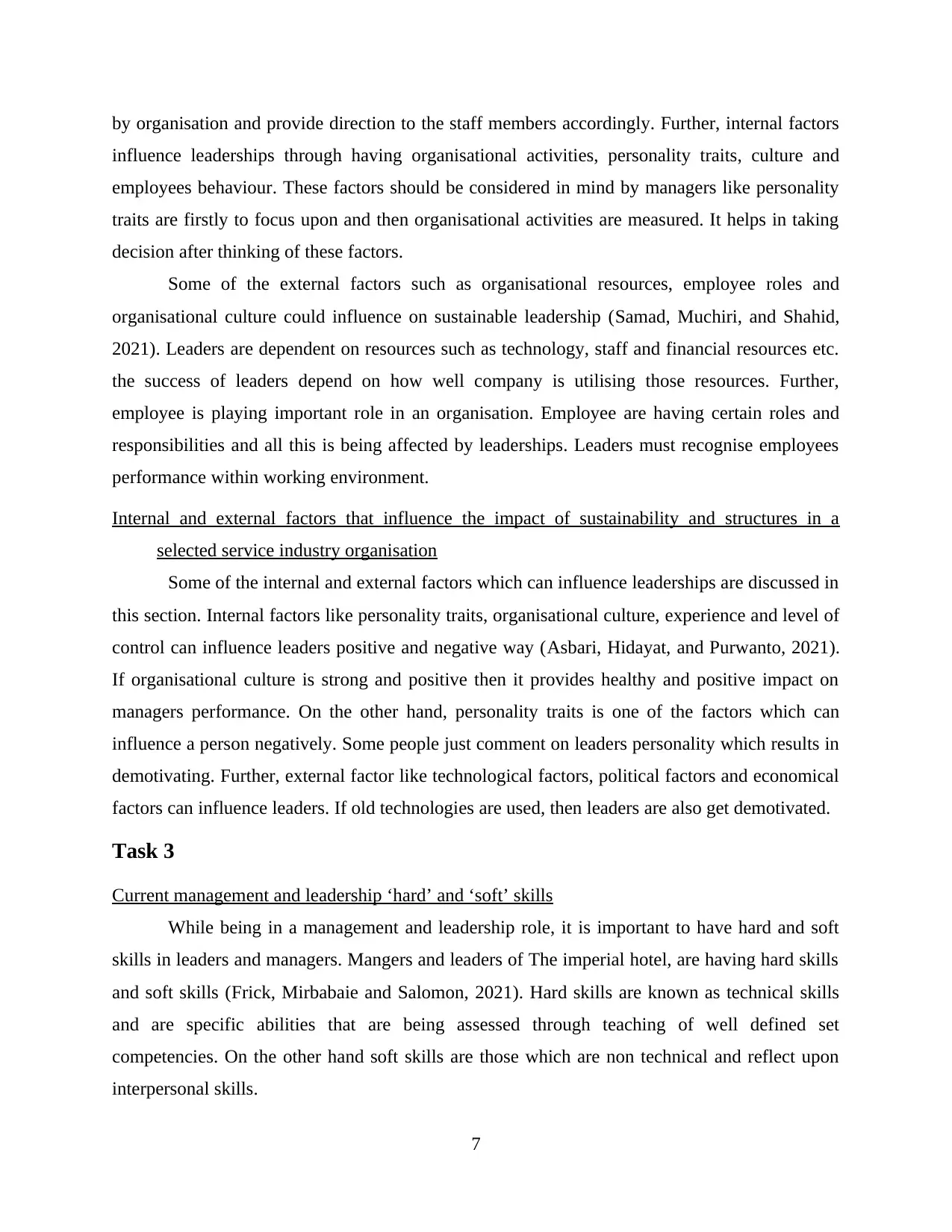
by organisation and provide direction to the staff members accordingly. Further, internal factors
influence leaderships through having organisational activities, personality traits, culture and
employees behaviour. These factors should be considered in mind by managers like personality
traits are firstly to focus upon and then organisational activities are measured. It helps in taking
decision after thinking of these factors.
Some of the external factors such as organisational resources, employee roles and
organisational culture could influence on sustainable leadership (Samad, Muchiri, and Shahid,
2021). Leaders are dependent on resources such as technology, staff and financial resources etc.
the success of leaders depend on how well company is utilising those resources. Further,
employee is playing important role in an organisation. Employee are having certain roles and
responsibilities and all this is being affected by leaderships. Leaders must recognise employees
performance within working environment.
Internal and external factors that influence the impact of sustainability and structures in a
selected service industry organisation
Some of the internal and external factors which can influence leaderships are discussed in
this section. Internal factors like personality traits, organisational culture, experience and level of
control can influence leaders positive and negative way (Asbari, Hidayat, and Purwanto, 2021).
If organisational culture is strong and positive then it provides healthy and positive impact on
managers performance. On the other hand, personality traits is one of the factors which can
influence a person negatively. Some people just comment on leaders personality which results in
demotivating. Further, external factor like technological factors, political factors and economical
factors can influence leaders. If old technologies are used, then leaders are also get demotivated.
Task 3
Current management and leadership ‘hard’ and ‘soft’ skills
While being in a management and leadership role, it is important to have hard and soft
skills in leaders and managers. Mangers and leaders of The imperial hotel, are having hard skills
and soft skills (Frick, Mirbabaie and Salomon, 2021). Hard skills are known as technical skills
and are specific abilities that are being assessed through teaching of well defined set
competencies. On the other hand soft skills are those which are non technical and reflect upon
interpersonal skills.
7
influence leaderships through having organisational activities, personality traits, culture and
employees behaviour. These factors should be considered in mind by managers like personality
traits are firstly to focus upon and then organisational activities are measured. It helps in taking
decision after thinking of these factors.
Some of the external factors such as organisational resources, employee roles and
organisational culture could influence on sustainable leadership (Samad, Muchiri, and Shahid,
2021). Leaders are dependent on resources such as technology, staff and financial resources etc.
the success of leaders depend on how well company is utilising those resources. Further,
employee is playing important role in an organisation. Employee are having certain roles and
responsibilities and all this is being affected by leaderships. Leaders must recognise employees
performance within working environment.
Internal and external factors that influence the impact of sustainability and structures in a
selected service industry organisation
Some of the internal and external factors which can influence leaderships are discussed in
this section. Internal factors like personality traits, organisational culture, experience and level of
control can influence leaders positive and negative way (Asbari, Hidayat, and Purwanto, 2021).
If organisational culture is strong and positive then it provides healthy and positive impact on
managers performance. On the other hand, personality traits is one of the factors which can
influence a person negatively. Some people just comment on leaders personality which results in
demotivating. Further, external factor like technological factors, political factors and economical
factors can influence leaders. If old technologies are used, then leaders are also get demotivated.
Task 3
Current management and leadership ‘hard’ and ‘soft’ skills
While being in a management and leadership role, it is important to have hard and soft
skills in leaders and managers. Mangers and leaders of The imperial hotel, are having hard skills
and soft skills (Frick, Mirbabaie and Salomon, 2021). Hard skills are known as technical skills
and are specific abilities that are being assessed through teaching of well defined set
competencies. On the other hand soft skills are those which are non technical and reflect upon
interpersonal skills.
7
Paraphrase This Document
Need a fresh take? Get an instant paraphrase of this document with our AI Paraphraser
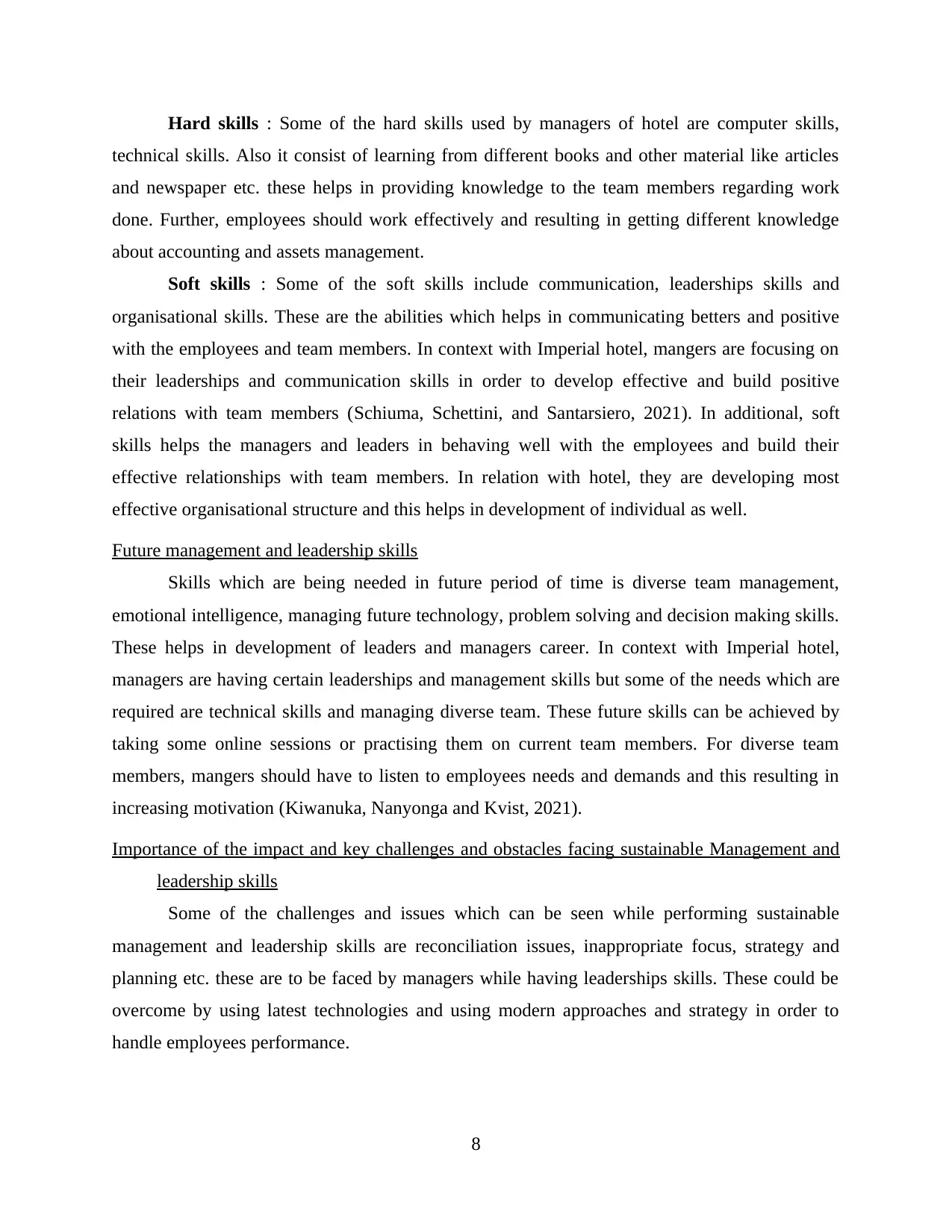
Hard skills : Some of the hard skills used by managers of hotel are computer skills,
technical skills. Also it consist of learning from different books and other material like articles
and newspaper etc. these helps in providing knowledge to the team members regarding work
done. Further, employees should work effectively and resulting in getting different knowledge
about accounting and assets management.
Soft skills : Some of the soft skills include communication, leaderships skills and
organisational skills. These are the abilities which helps in communicating betters and positive
with the employees and team members. In context with Imperial hotel, mangers are focusing on
their leaderships and communication skills in order to develop effective and build positive
relations with team members (Schiuma, Schettini, and Santarsiero, 2021). In additional, soft
skills helps the managers and leaders in behaving well with the employees and build their
effective relationships with team members. In relation with hotel, they are developing most
effective organisational structure and this helps in development of individual as well.
Future management and leadership skills
Skills which are being needed in future period of time is diverse team management,
emotional intelligence, managing future technology, problem solving and decision making skills.
These helps in development of leaders and managers career. In context with Imperial hotel,
managers are having certain leaderships and management skills but some of the needs which are
required are technical skills and managing diverse team. These future skills can be achieved by
taking some online sessions or practising them on current team members. For diverse team
members, mangers should have to listen to employees needs and demands and this resulting in
increasing motivation (Kiwanuka, Nanyonga and Kvist, 2021).
Importance of the impact and key challenges and obstacles facing sustainable Management and
leadership skills
Some of the challenges and issues which can be seen while performing sustainable
management and leadership skills are reconciliation issues, inappropriate focus, strategy and
planning etc. these are to be faced by managers while having leaderships skills. These could be
overcome by using latest technologies and using modern approaches and strategy in order to
handle employees performance.
8
technical skills. Also it consist of learning from different books and other material like articles
and newspaper etc. these helps in providing knowledge to the team members regarding work
done. Further, employees should work effectively and resulting in getting different knowledge
about accounting and assets management.
Soft skills : Some of the soft skills include communication, leaderships skills and
organisational skills. These are the abilities which helps in communicating betters and positive
with the employees and team members. In context with Imperial hotel, mangers are focusing on
their leaderships and communication skills in order to develop effective and build positive
relations with team members (Schiuma, Schettini, and Santarsiero, 2021). In additional, soft
skills helps the managers and leaders in behaving well with the employees and build their
effective relationships with team members. In relation with hotel, they are developing most
effective organisational structure and this helps in development of individual as well.
Future management and leadership skills
Skills which are being needed in future period of time is diverse team management,
emotional intelligence, managing future technology, problem solving and decision making skills.
These helps in development of leaders and managers career. In context with Imperial hotel,
managers are having certain leaderships and management skills but some of the needs which are
required are technical skills and managing diverse team. These future skills can be achieved by
taking some online sessions or practising them on current team members. For diverse team
members, mangers should have to listen to employees needs and demands and this resulting in
increasing motivation (Kiwanuka, Nanyonga and Kvist, 2021).
Importance of the impact and key challenges and obstacles facing sustainable Management and
leadership skills
Some of the challenges and issues which can be seen while performing sustainable
management and leadership skills are reconciliation issues, inappropriate focus, strategy and
planning etc. these are to be faced by managers while having leaderships skills. These could be
overcome by using latest technologies and using modern approaches and strategy in order to
handle employees performance.
8
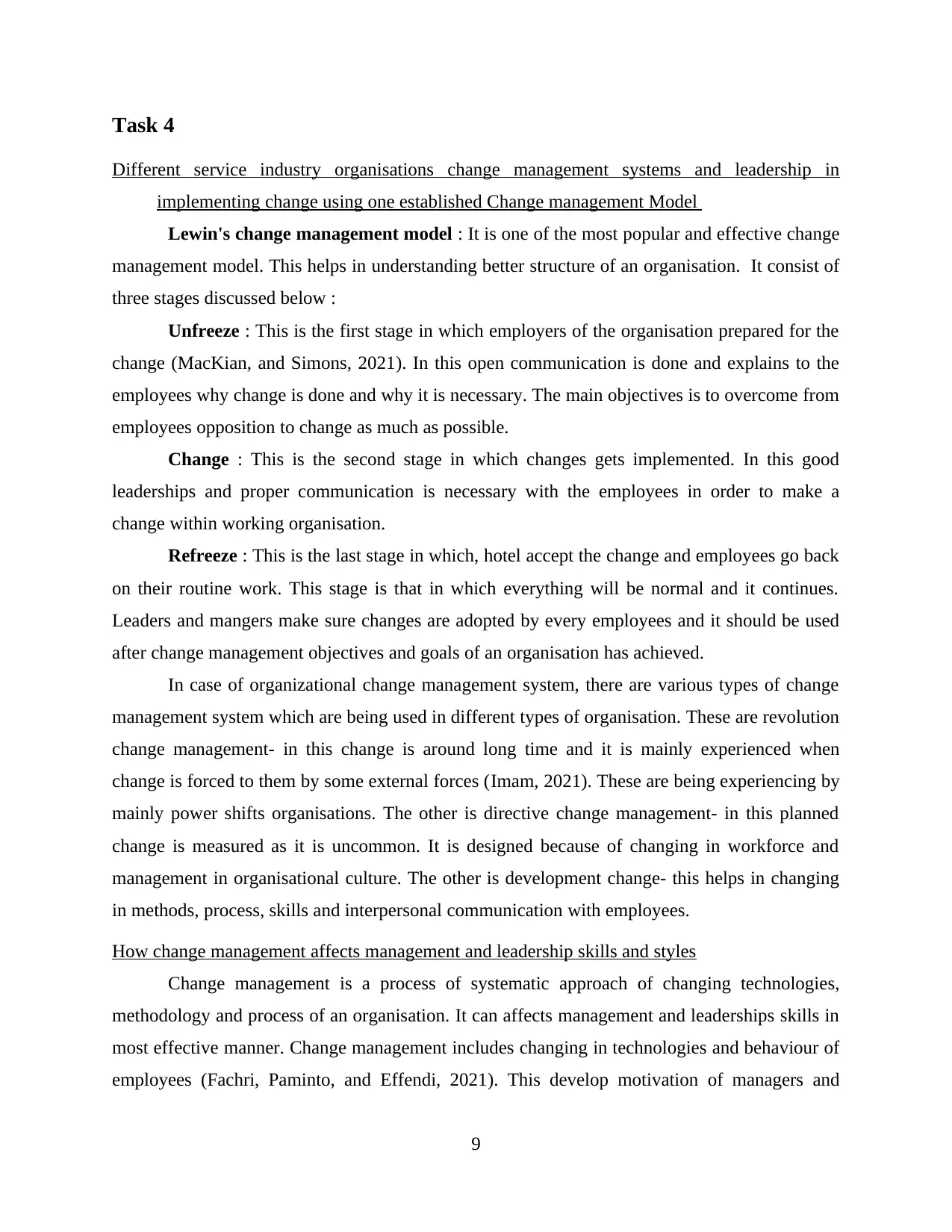
Task 4
Different service industry organisations change management systems and leadership in
implementing change using one established Change management Model
Lewin's change management model : It is one of the most popular and effective change
management model. This helps in understanding better structure of an organisation. It consist of
three stages discussed below :
Unfreeze : This is the first stage in which employers of the organisation prepared for the
change (MacKian, and Simons, 2021). In this open communication is done and explains to the
employees why change is done and why it is necessary. The main objectives is to overcome from
employees opposition to change as much as possible.
Change : This is the second stage in which changes gets implemented. In this good
leaderships and proper communication is necessary with the employees in order to make a
change within working organisation.
Refreeze : This is the last stage in which, hotel accept the change and employees go back
on their routine work. This stage is that in which everything will be normal and it continues.
Leaders and mangers make sure changes are adopted by every employees and it should be used
after change management objectives and goals of an organisation has achieved.
In case of organizational change management system, there are various types of change
management system which are being used in different types of organisation. These are revolution
change management- in this change is around long time and it is mainly experienced when
change is forced to them by some external forces (Imam, 2021). These are being experiencing by
mainly power shifts organisations. The other is directive change management- in this planned
change is measured as it is uncommon. It is designed because of changing in workforce and
management in organisational culture. The other is development change- this helps in changing
in methods, process, skills and interpersonal communication with employees.
How change management affects management and leadership skills and styles
Change management is a process of systematic approach of changing technologies,
methodology and process of an organisation. It can affects management and leaderships skills in
most effective manner. Change management includes changing in technologies and behaviour of
employees (Fachri, Paminto, and Effendi, 2021). This develop motivation of managers and
9
Different service industry organisations change management systems and leadership in
implementing change using one established Change management Model
Lewin's change management model : It is one of the most popular and effective change
management model. This helps in understanding better structure of an organisation. It consist of
three stages discussed below :
Unfreeze : This is the first stage in which employers of the organisation prepared for the
change (MacKian, and Simons, 2021). In this open communication is done and explains to the
employees why change is done and why it is necessary. The main objectives is to overcome from
employees opposition to change as much as possible.
Change : This is the second stage in which changes gets implemented. In this good
leaderships and proper communication is necessary with the employees in order to make a
change within working organisation.
Refreeze : This is the last stage in which, hotel accept the change and employees go back
on their routine work. This stage is that in which everything will be normal and it continues.
Leaders and mangers make sure changes are adopted by every employees and it should be used
after change management objectives and goals of an organisation has achieved.
In case of organizational change management system, there are various types of change
management system which are being used in different types of organisation. These are revolution
change management- in this change is around long time and it is mainly experienced when
change is forced to them by some external forces (Imam, 2021). These are being experiencing by
mainly power shifts organisations. The other is directive change management- in this planned
change is measured as it is uncommon. It is designed because of changing in workforce and
management in organisational culture. The other is development change- this helps in changing
in methods, process, skills and interpersonal communication with employees.
How change management affects management and leadership skills and styles
Change management is a process of systematic approach of changing technologies,
methodology and process of an organisation. It can affects management and leaderships skills in
most effective manner. Change management includes changing in technologies and behaviour of
employees (Fachri, Paminto, and Effendi, 2021). This develop motivation of managers and
9
⊘ This is a preview!⊘
Do you want full access?
Subscribe today to unlock all pages.

Trusted by 1+ million students worldwide
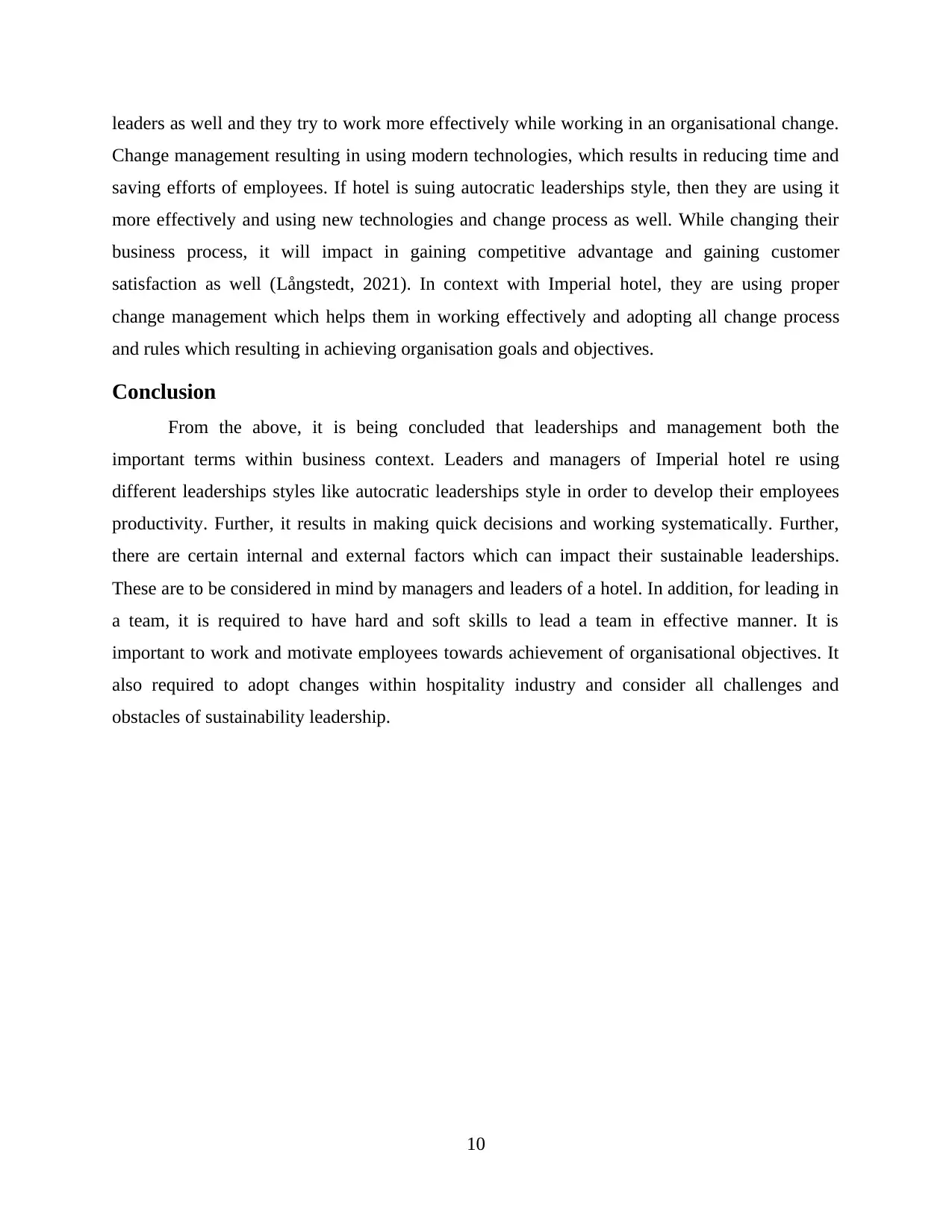
leaders as well and they try to work more effectively while working in an organisational change.
Change management resulting in using modern technologies, which results in reducing time and
saving efforts of employees. If hotel is suing autocratic leaderships style, then they are using it
more effectively and using new technologies and change process as well. While changing their
business process, it will impact in gaining competitive advantage and gaining customer
satisfaction as well (Långstedt, 2021). In context with Imperial hotel, they are using proper
change management which helps them in working effectively and adopting all change process
and rules which resulting in achieving organisation goals and objectives.
Conclusion
From the above, it is being concluded that leaderships and management both the
important terms within business context. Leaders and managers of Imperial hotel re using
different leaderships styles like autocratic leaderships style in order to develop their employees
productivity. Further, it results in making quick decisions and working systematically. Further,
there are certain internal and external factors which can impact their sustainable leaderships.
These are to be considered in mind by managers and leaders of a hotel. In addition, for leading in
a team, it is required to have hard and soft skills to lead a team in effective manner. It is
important to work and motivate employees towards achievement of organisational objectives. It
also required to adopt changes within hospitality industry and consider all challenges and
obstacles of sustainability leadership.
10
Change management resulting in using modern technologies, which results in reducing time and
saving efforts of employees. If hotel is suing autocratic leaderships style, then they are using it
more effectively and using new technologies and change process as well. While changing their
business process, it will impact in gaining competitive advantage and gaining customer
satisfaction as well (Långstedt, 2021). In context with Imperial hotel, they are using proper
change management which helps them in working effectively and adopting all change process
and rules which resulting in achieving organisation goals and objectives.
Conclusion
From the above, it is being concluded that leaderships and management both the
important terms within business context. Leaders and managers of Imperial hotel re using
different leaderships styles like autocratic leaderships style in order to develop their employees
productivity. Further, it results in making quick decisions and working systematically. Further,
there are certain internal and external factors which can impact their sustainable leaderships.
These are to be considered in mind by managers and leaders of a hotel. In addition, for leading in
a team, it is required to have hard and soft skills to lead a team in effective manner. It is
important to work and motivate employees towards achievement of organisational objectives. It
also required to adopt changes within hospitality industry and consider all challenges and
obstacles of sustainability leadership.
10
Paraphrase This Document
Need a fresh take? Get an instant paraphrase of this document with our AI Paraphraser
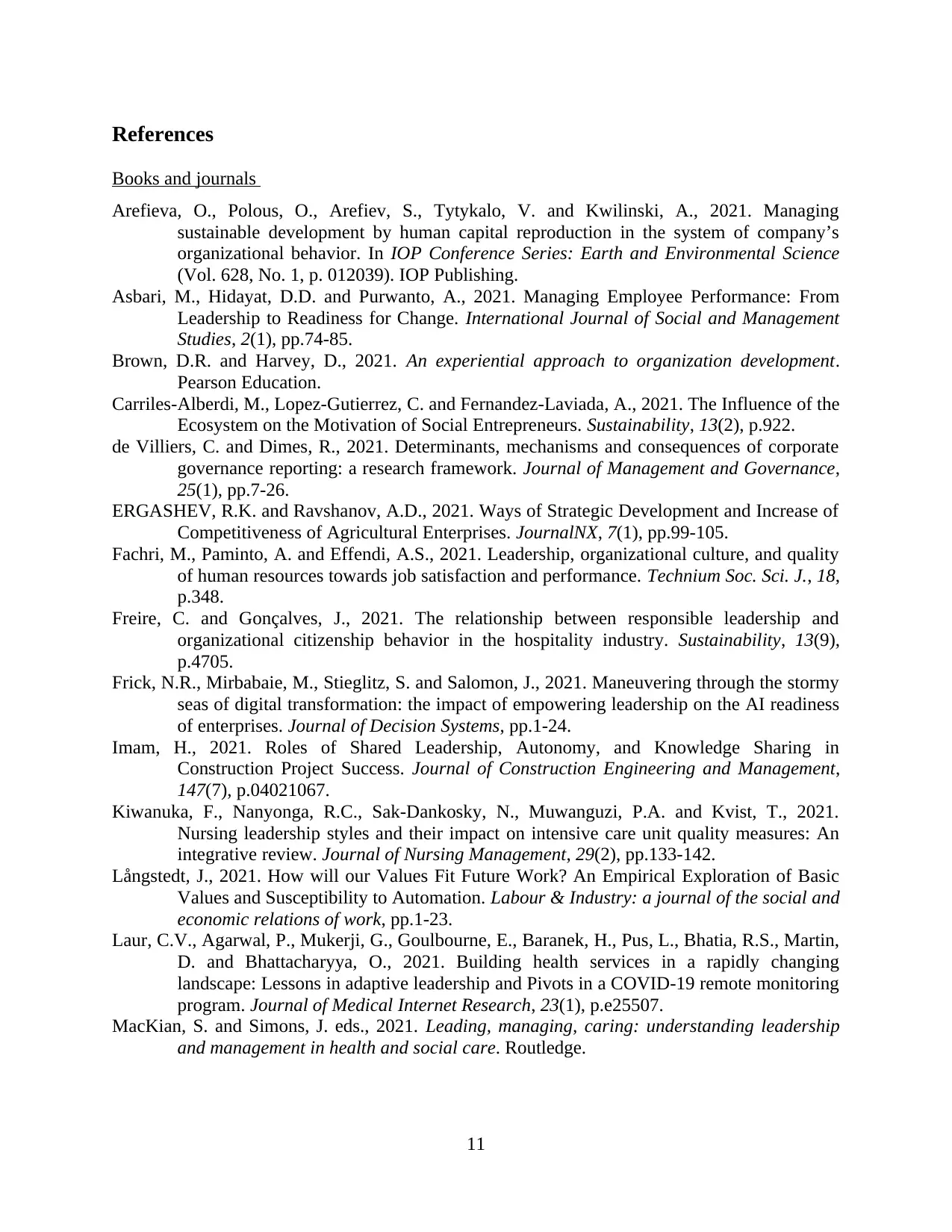
References
Books and journals
Arefieva, O., Polous, O., Arefiev, S., Tytykalo, V. and Kwilinski, A., 2021. Managing
sustainable development by human capital reproduction in the system of company’s
organizational behavior. In IOP Conference Series: Earth and Environmental Science
(Vol. 628, No. 1, p. 012039). IOP Publishing.
Asbari, M., Hidayat, D.D. and Purwanto, A., 2021. Managing Employee Performance: From
Leadership to Readiness for Change. International Journal of Social and Management
Studies, 2(1), pp.74-85.
Brown, D.R. and Harvey, D., 2021. An experiential approach to organization development.
Pearson Education.
Carriles-Alberdi, M., Lopez-Gutierrez, C. and Fernandez-Laviada, A., 2021. The Influence of the
Ecosystem on the Motivation of Social Entrepreneurs. Sustainability, 13(2), p.922.
de Villiers, C. and Dimes, R., 2021. Determinants, mechanisms and consequences of corporate
governance reporting: a research framework. Journal of Management and Governance,
25(1), pp.7-26.
ERGASHEV, R.K. and Ravshanov, A.D., 2021. Ways of Strategic Development and Increase of
Competitiveness of Agricultural Enterprises. JournalNX, 7(1), pp.99-105.
Fachri, M., Paminto, A. and Effendi, A.S., 2021. Leadership, organizational culture, and quality
of human resources towards job satisfaction and performance. Technium Soc. Sci. J., 18,
p.348.
Freire, C. and Gonçalves, J., 2021. The relationship between responsible leadership and
organizational citizenship behavior in the hospitality industry. Sustainability, 13(9),
p.4705.
Frick, N.R., Mirbabaie, M., Stieglitz, S. and Salomon, J., 2021. Maneuvering through the stormy
seas of digital transformation: the impact of empowering leadership on the AI readiness
of enterprises. Journal of Decision Systems, pp.1-24.
Imam, H., 2021. Roles of Shared Leadership, Autonomy, and Knowledge Sharing in
Construction Project Success. Journal of Construction Engineering and Management,
147(7), p.04021067.
Kiwanuka, F., Nanyonga, R.C., Sak‐Dankosky, N., Muwanguzi, P.A. and Kvist, T., 2021.
Nursing leadership styles and their impact on intensive care unit quality measures: An
integrative review. Journal of Nursing Management, 29(2), pp.133-142.
Långstedt, J., 2021. How will our Values Fit Future Work? An Empirical Exploration of Basic
Values and Susceptibility to Automation. Labour & Industry: a journal of the social and
economic relations of work, pp.1-23.
Laur, C.V., Agarwal, P., Mukerji, G., Goulbourne, E., Baranek, H., Pus, L., Bhatia, R.S., Martin,
D. and Bhattacharyya, O., 2021. Building health services in a rapidly changing
landscape: Lessons in adaptive leadership and Pivots in a COVID-19 remote monitoring
program. Journal of Medical Internet Research, 23(1), p.e25507.
MacKian, S. and Simons, J. eds., 2021. Leading, managing, caring: understanding leadership
and management in health and social care. Routledge.
11
Books and journals
Arefieva, O., Polous, O., Arefiev, S., Tytykalo, V. and Kwilinski, A., 2021. Managing
sustainable development by human capital reproduction in the system of company’s
organizational behavior. In IOP Conference Series: Earth and Environmental Science
(Vol. 628, No. 1, p. 012039). IOP Publishing.
Asbari, M., Hidayat, D.D. and Purwanto, A., 2021. Managing Employee Performance: From
Leadership to Readiness for Change. International Journal of Social and Management
Studies, 2(1), pp.74-85.
Brown, D.R. and Harvey, D., 2021. An experiential approach to organization development.
Pearson Education.
Carriles-Alberdi, M., Lopez-Gutierrez, C. and Fernandez-Laviada, A., 2021. The Influence of the
Ecosystem on the Motivation of Social Entrepreneurs. Sustainability, 13(2), p.922.
de Villiers, C. and Dimes, R., 2021. Determinants, mechanisms and consequences of corporate
governance reporting: a research framework. Journal of Management and Governance,
25(1), pp.7-26.
ERGASHEV, R.K. and Ravshanov, A.D., 2021. Ways of Strategic Development and Increase of
Competitiveness of Agricultural Enterprises. JournalNX, 7(1), pp.99-105.
Fachri, M., Paminto, A. and Effendi, A.S., 2021. Leadership, organizational culture, and quality
of human resources towards job satisfaction and performance. Technium Soc. Sci. J., 18,
p.348.
Freire, C. and Gonçalves, J., 2021. The relationship between responsible leadership and
organizational citizenship behavior in the hospitality industry. Sustainability, 13(9),
p.4705.
Frick, N.R., Mirbabaie, M., Stieglitz, S. and Salomon, J., 2021. Maneuvering through the stormy
seas of digital transformation: the impact of empowering leadership on the AI readiness
of enterprises. Journal of Decision Systems, pp.1-24.
Imam, H., 2021. Roles of Shared Leadership, Autonomy, and Knowledge Sharing in
Construction Project Success. Journal of Construction Engineering and Management,
147(7), p.04021067.
Kiwanuka, F., Nanyonga, R.C., Sak‐Dankosky, N., Muwanguzi, P.A. and Kvist, T., 2021.
Nursing leadership styles and their impact on intensive care unit quality measures: An
integrative review. Journal of Nursing Management, 29(2), pp.133-142.
Långstedt, J., 2021. How will our Values Fit Future Work? An Empirical Exploration of Basic
Values and Susceptibility to Automation. Labour & Industry: a journal of the social and
economic relations of work, pp.1-23.
Laur, C.V., Agarwal, P., Mukerji, G., Goulbourne, E., Baranek, H., Pus, L., Bhatia, R.S., Martin,
D. and Bhattacharyya, O., 2021. Building health services in a rapidly changing
landscape: Lessons in adaptive leadership and Pivots in a COVID-19 remote monitoring
program. Journal of Medical Internet Research, 23(1), p.e25507.
MacKian, S. and Simons, J. eds., 2021. Leading, managing, caring: understanding leadership
and management in health and social care. Routledge.
11
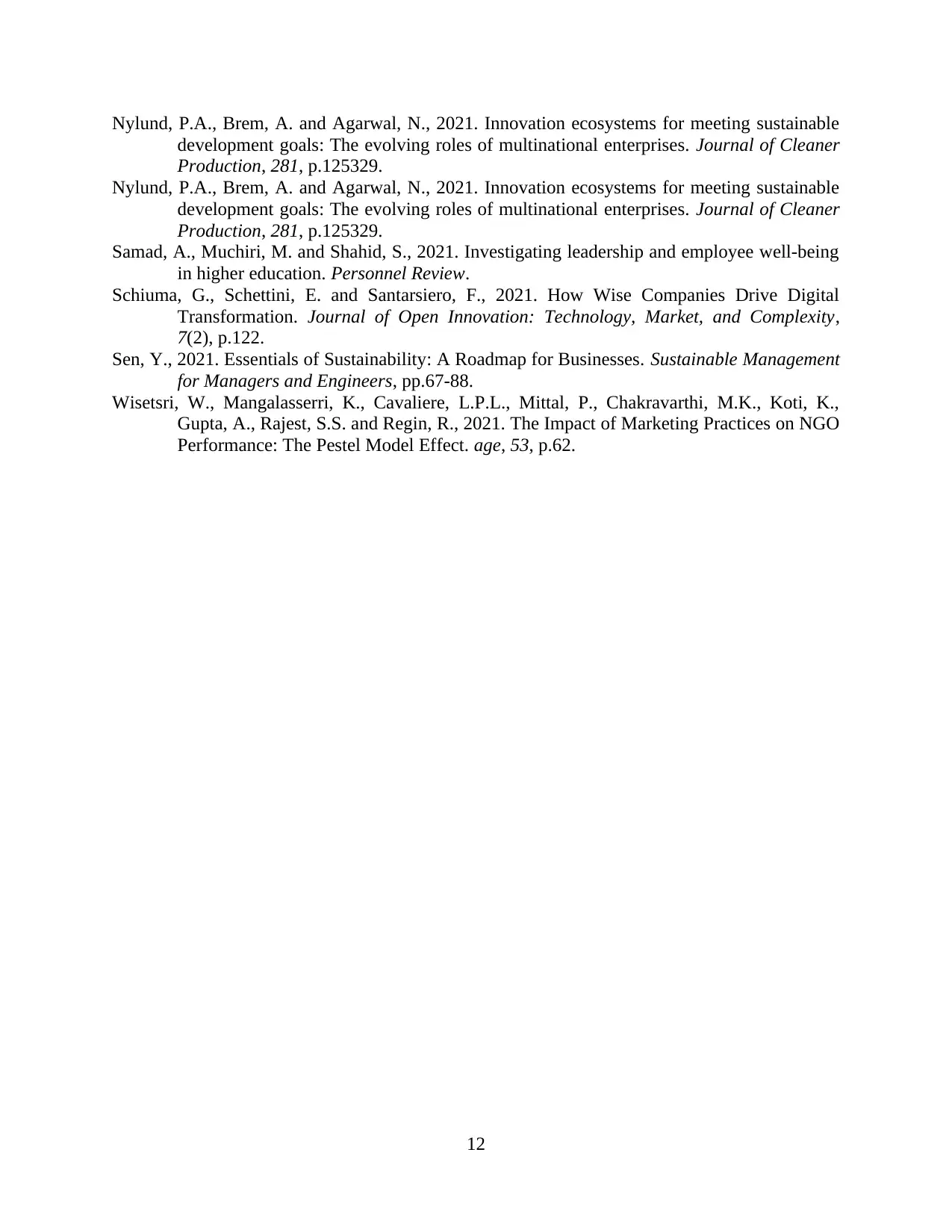
Nylund, P.A., Brem, A. and Agarwal, N., 2021. Innovation ecosystems for meeting sustainable
development goals: The evolving roles of multinational enterprises. Journal of Cleaner
Production, 281, p.125329.
Nylund, P.A., Brem, A. and Agarwal, N., 2021. Innovation ecosystems for meeting sustainable
development goals: The evolving roles of multinational enterprises. Journal of Cleaner
Production, 281, p.125329.
Samad, A., Muchiri, M. and Shahid, S., 2021. Investigating leadership and employee well-being
in higher education. Personnel Review.
Schiuma, G., Schettini, E. and Santarsiero, F., 2021. How Wise Companies Drive Digital
Transformation. Journal of Open Innovation: Technology, Market, and Complexity,
7(2), p.122.
Sen, Y., 2021. Essentials of Sustainability: A Roadmap for Businesses. Sustainable Management
for Managers and Engineers, pp.67-88.
Wisetsri, W., Mangalasserri, K., Cavaliere, L.P.L., Mittal, P., Chakravarthi, M.K., Koti, K.,
Gupta, A., Rajest, S.S. and Regin, R., 2021. The Impact of Marketing Practices on NGO
Performance: The Pestel Model Effect. age, 53, p.62.
12
development goals: The evolving roles of multinational enterprises. Journal of Cleaner
Production, 281, p.125329.
Nylund, P.A., Brem, A. and Agarwal, N., 2021. Innovation ecosystems for meeting sustainable
development goals: The evolving roles of multinational enterprises. Journal of Cleaner
Production, 281, p.125329.
Samad, A., Muchiri, M. and Shahid, S., 2021. Investigating leadership and employee well-being
in higher education. Personnel Review.
Schiuma, G., Schettini, E. and Santarsiero, F., 2021. How Wise Companies Drive Digital
Transformation. Journal of Open Innovation: Technology, Market, and Complexity,
7(2), p.122.
Sen, Y., 2021. Essentials of Sustainability: A Roadmap for Businesses. Sustainable Management
for Managers and Engineers, pp.67-88.
Wisetsri, W., Mangalasserri, K., Cavaliere, L.P.L., Mittal, P., Chakravarthi, M.K., Koti, K.,
Gupta, A., Rajest, S.S. and Regin, R., 2021. The Impact of Marketing Practices on NGO
Performance: The Pestel Model Effect. age, 53, p.62.
12
⊘ This is a preview!⊘
Do you want full access?
Subscribe today to unlock all pages.

Trusted by 1+ million students worldwide
1 out of 12
Related Documents
Your All-in-One AI-Powered Toolkit for Academic Success.
+13062052269
info@desklib.com
Available 24*7 on WhatsApp / Email
![[object Object]](/_next/static/media/star-bottom.7253800d.svg)
Unlock your academic potential
Copyright © 2020–2026 A2Z Services. All Rights Reserved. Developed and managed by ZUCOL.

